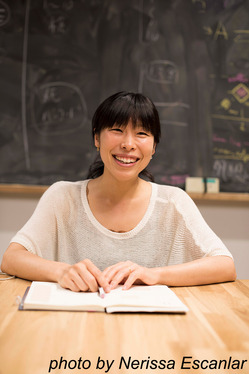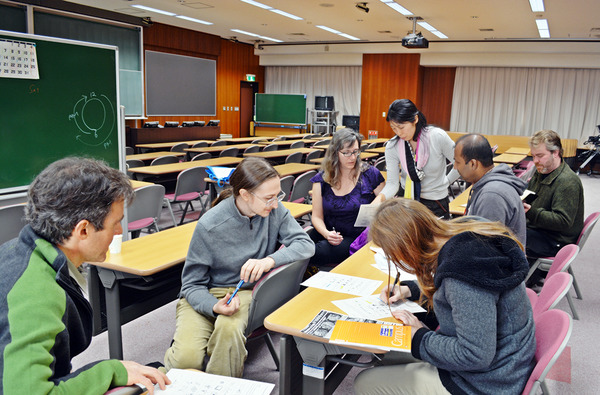ELSI Blog
104 ELSI Japanese Classes
 ELSI has been offering our own in-house Japanese language classes since October 2013, of which I am the proud instructor. When we started the language program, we had only a First Year (entry level) class. We have just completed the First Year class and a Second Year (intermediate) class for 2014-2015. We begin our lesson year in the fall and end whenever we finish the planned coursework based on the textbook used. This year, we had 4-5 long-term students including ELSI researchers and their families attending the classes. We also welcome visitors to ELSI who are interested in studying Japanese. ELSI strives to create a good learning environment for our researchers by giving more time for each lesson compared to regular college courses, by having homework/small quizzes but no big burdensome exams, and by rescheduling classes depending on students' business trips, as a few examples. Students can enroll in our classes even in the middle of the semester.
ELSI has been offering our own in-house Japanese language classes since October 2013, of which I am the proud instructor. When we started the language program, we had only a First Year (entry level) class. We have just completed the First Year class and a Second Year (intermediate) class for 2014-2015. We begin our lesson year in the fall and end whenever we finish the planned coursework based on the textbook used. This year, we had 4-5 long-term students including ELSI researchers and their families attending the classes. We also welcome visitors to ELSI who are interested in studying Japanese. ELSI strives to create a good learning environment for our researchers by giving more time for each lesson compared to regular college courses, by having homework/small quizzes but no big burdensome exams, and by rescheduling classes depending on students' business trips, as a few examples. Students can enroll in our classes even in the middle of the semester.
Our emphasis is on communicative tasks using the four language skills of listening, speaking, reading, and writing. Here are some examples of tasks which ELSI classes have covered.
Beginning of ELSI First Year Japanese Class
* Can make basic greetings appropriate to the time of day to a friend or a neighbor
* Can order doughnuts at Mister Donut
Ten Months Later: End of ELSI First Year Japanese Class
* Can simply explain your symptoms and also give advice to friends who do not feel good
* Can ask a friend in short simple terms about a place/thing which you are thinking of going/buying and also answer those questions from a friend while sharing your own experience or expressing your opinions
* Can write a short thank you letter while expressing some detail about feelings of gratitude in terms of what a friend helped with or did for you
Ten Months Later: End of ELSI Second Year Japanese Class
* Can talk about your estimations and opinions while looking at a graph from current news or newspapers
* Can explain in simple terms and consult with ELSI staff about situations and difficulties when you are involved with unexpected and unfortunate situations in our building
* Can welcome staff from a different institute while politely asking and answering questions about familiar topics such as interests, work, etc.
I feel great honor to have ELSI researchers and their family members as my students. I am amazed by how excited they are to express their thoughts and to try to express it using what they have learned. It was a kind of "culture shock" for me to see the color of my students' faces change with excitement when asked to think and speak in Japanese depending on a given situation or task. I could see their motivation and commitment to learn Japanese which is truly impressive. They know that it won't be as simple as exercises of drills and repetition from textbooks, however, they are still deeply engaged, push themselves, and take it seriously. Since they are excited to use what they have learned in my class and even outside, they acquire language amazingly quickly. Even though we spend more time for each lesson and do not have exams, my students' proficiency after two years is almost equal to what they would learn in some American regular college courses for three years. (I can say this having experience teaching Japanese at an American university.)
What a privilege it is to have students who keep me busy coming up with more and more new tasks and activities to keep up with them. I have asked ELSI staff to join our classes to have conversational exchanges with students and I assigned homework in which students have to talk with staff over certain tasks. In our exchanges, we have shared memories of real trips, recipes that we like, restaurants around campus or in the Tokyo area which have good deals, and so on. We introduced own family or friends in First Year Class and talked about our childhoods while sharing what our parents let or did not let us do in Second Year Class.
I hope that ELSI classes also become a means for ELSI members, both researchers and staff, to get to know each other. My students' effort and enthusiasm for learning Japanese always impresses me and other Japanese staff. There are numerous times when the ELSI staff has told me how impressive and enjoyable it is when ELSI students try to communicate in Japanese even with short sentences. Since English is the language in our institute, we try to stick to English in the majority of our conversations. However, it is different if you want to practice Japanese. There are a lot of opportunities where one could speak Japanese in our daily conversation for one's practice. At ELSI, we are family, so you don't need to feel nervous or shy. We are looking forward to chatting and getting to know you more in Japanese.
I admit, I am a proud teacher of my ELSI students! I am impressed by how they respect and support each other. They know how a learner can feel nervous, frustrated, or anxious when speaking Japanese. They smile and praise their classmates when they struggle while trying very hard. They never mind speaking again if their partners could not catch it the first time. They never mind waiting if their classmates need more time to answer a question or compose what they want to say. I appreciate that they support each other in my class which makes a warm and encouraging environment for ELSI students to communicate and understand each other in Japanese. I would not be able to make the class environment without them. I appreciate ELSI and all ELSI students and visitors who provide me with this teaching opportunity which makes my days and life rewarding and a delight.











